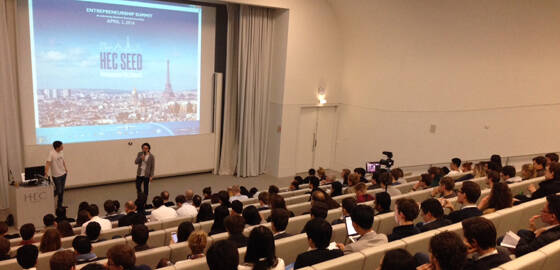Learning about financing seen as a priority for budding entrepreneurs at HEC Seed
During the second edition of the international entrepreneurship summit on HEC Paris' campus, the majority of participants made a beeline for workshops pertaining to financing a start-up, the most popular was a session on how to connect with VCs.

Some 300 participants headed to HEC Seed, which took place on April 2nd, to network and attend a choice of talks and workshops on topics to help entrepreneurs create and run a successful start-up. These included discussions on marketing and strategy, the legal aspect of a start-up, how to choose the right people to work with, and also workshops on financing. Olivier Younes’ session on connecting with venture capitalists (VCs) was the most popular.
One participant, who is planning to start up a venture capital company, said the workshops gave her a lot of “great insights” on how an entrepreneur gets finance from a venture capitalist. “One of the biggest mistakes some entrepreneurs can make with VCs is not understanding what they expect,” said Kana Narita, who works in the investment department of a Japanese private equity firm in the city of London, and is also an Executive MBA student at HEC Paris.
Entrepreneur and former VC Olivier Younes, who is also a professor at HEC Paris, said there is often a taboo around VCs but that entrepreneurs just need to have empathy for venture capitalists, if they are to provide you with the money you need to kick start a business. "If you don’t understand how a VC works, you won’t make it," said Younes. He explained that ultimately they are interested in an entrepreneur’s idea but that ultimately will be looking at your business’s value creation and cash-on-cash (cash income on cash invested).
Daniel Urbisci, who is about to start an internship for a venture capitalist company in Ulan Bator came to HEC Seed to learn more about what it is to be an entrepreneur. He said the workshops taught him more about the specifics of financing start-ups and their terms and structures.
"If you understand what’s going on in the mind of a venture capitalist, then you can work your way backwards from the initial seed money to be able to scale up and give them the framework you already know they are looking for," he said. “I have learned that you must always model your processes according to this, even though your strategy is still based on your founder’s goals and desires,” he added.
Urbisci, who just completed his MBA at HEC Paris, hopes eventually to found a real estate start-up in an emerging market, after he works for the Asian entrepreneurial firm.
Many participants were also interested to chat to Joerg Rheinboldt, one of two keynote speakers at HEC Seed, who gave tips on what is needed for a successful start-up to work. The German entrepreneur is managing director of Axel Springer Plug and Play, an early stage VC company that helps mainly technology companies get on their feet financially, and offers mentoring.
"We ask every company we want to support the following questions: ‘why this idea, is this the right team and why now?’ He added that this last question is very important as timing is critical when it comes to launching a start-up.
Rheinboldt re-emphasized the importance of having solid values and creating data to back up an idea by testing it first. However, he said the most important factor in a successful start-up is having the right people: "It’s rarely the case that excellent people have a mediocre idea."